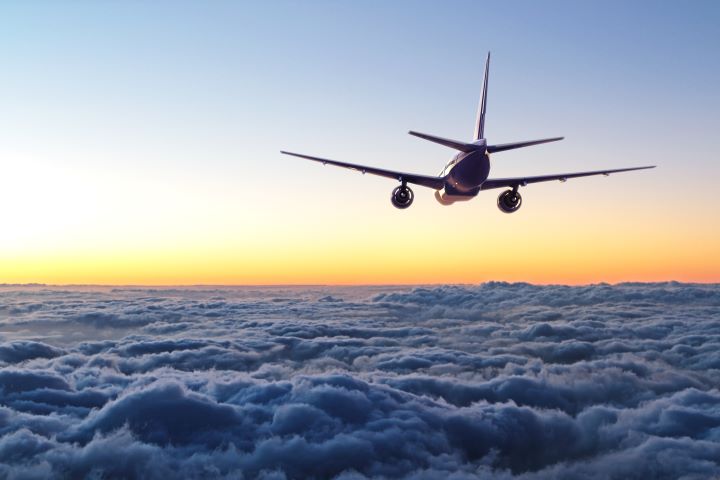It’s time to put an end to aviation’s tax privilege – Inside track
4 min read
This post is by Matt Finch, UK policy manager at Transport & Environment.
Let’s start with a quick tax-related quiz:
- Which is the odd one out: food; medicines; business class airline tickets to New York, or mobility aids for the elderly?
- Which is higher: the fuel duty paid last time you filled up a fossil fuel powered car, or the total of all the fuel duties British Airways has ever paid?
- If you apply the polluter pays principle, does the polluter a) pay something, or b) pay nothing?
Just three questions and here are the answers:
Question 1
The astute among you would have recognised this as a VAT question. Incredibly, the odd one out is mobility aids for the elderly, on which pensioners have to pay five per cent VAT when, for example, stairlifts are installed. Food, medicine and business class airline tickets are all zero rated. The principle of charging VAT on anything but essentials is well established but is completely ignored when it comes to air travel. The UK is an outlier on this: VAT is charged on domestic tickets in 23 out of the 27 EU states, and in other countries, including Australia, Canada, India and New Zealand. Air passenger duty is applied to flight tickets, but the revenue from this comes nowhere close to what VAT at 20 per cent would bring in.
Question 2
Incredibly, no fuel duty is, or ever has been, applied to jet fuel burnt in commercial aircraft. This means that, if you’ve ever filled up a car with petrol or diesel, you’ve paid more fuel duty than British Airways has ever paid. Which is, quite frankly, ridiculous. Jet fuel is currently exempted from fuel duty, but there is nothing stopping the chancellor changing this at the next budget, except lack of political will. It seems strange that, amidst both a cost of living and climate crisis, this exemption still holds. Especially as, at current prices, train operators pay 10.18 pence per litre (ppl) for diesel, individuals who undertake personal flights for pleasure (hobby flying) pay 36.29 ppl and all road users pay 52.95 ppl. The EU has proposed applying fuel duty at an equivalent rate of 32 ppl. Again, UK aviation is the outlier.
Question 3
The polluter pays principle was recently enshrined again in UK law by the government post-Brexit, and the concept is simple: polluters are financially responsible for the environmental damage they cause. In the UK, climate change will result in rail lines having to be moved, air conditioning having to be installed in schools and nursing homes due to hotter summers, etc. The climate changing aviation sector should contribute its fair share for these costs. The ideal mechanism to do this already exists in the form of the UK emissions trading scheme (UK ETS). However, the vast majority of emissions that airlines produce do not fall under the scheme and, of the ones that do, the government gives airlines free allowances to cover roughly half of the regulated emissions. This is demonstrated in the graph below. The dark blue areas are the emissions that did not fall under the scheme in 2022, and the orange areas are emissions under the scheme but which airlines did not have to pay for. What’s left, the light blue areas, are clearly in the minority, and results in are the effective carbon prices being paid by each airline (shown at the end of each bar). Other participants in the UK ETS which are not airlines had to pay an average carbon price of £79 per tonne.
The UK ETS is like the EU ETS, but there is one huge difference. The EU says explicitly that its scheme will be extended to all departing flights from 2027 (so no more dark blue bits), unless CORSIA – the weak offsetting scheme put in place by the International Civil Aviation Organisation – is dramatically strengthened. Which is highly unlikely. This will again make the UK an outlier.
The lost revenue is nearly £5 billion
All of this results in a massive ‘tax gap’. Transport & Environment has calculated the difference between what the UK’s aviation sector should have paid in taxes, if it was treated like any other sector, and what it currently pays. In 2022, a pandemic affected year, the difference was £4.7 billion, and this was the largest absolute tax gap out of the 31 European countries we analysed.
We further estimate that when the sector has fully recovered from the pandemic, the gap will be an incredible £7.4 billion in the UK. If aviation was treated like any other sector, the government would be billions of pounds better off. Or, put another way, for every pound it doesn’t take from aviation, it has to take a pound from somewhere else to pay for schools, hospitals and the like. Why are other sectors subsidising aviation?
Of course, all of this has a massive environmental consequence. By not being treated normally, the sector is, in effect, being subsidised to pollute. Emissions are higher than they would have been if airline costs were higher. By not taxing the greenhouse gas emissions airlines produce, there is less incentive to invest in sustainable aviation fuels and zero emission aircraft. And the government has less money to do so as well.
It is becoming increasingly unacceptable for such a hugely polluting industry to continue benefiting from fossil fuel subsidies. It is time for it to end.





